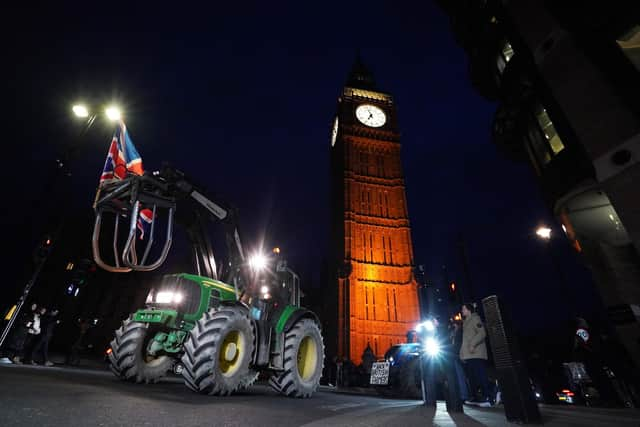We must protect British farming or everyone will end up paying the price - Yorkshire Post Letters
The announcement of the Government's Farming Recovery fund (The YP, April 9) will come as welcome news to some farmers with flooded fields even although Yorkshire farmers are not yet included. But for many of those who do qualify, the grants ranging from £500 to £25,000, will hardly touch the sides.
Even before Brexit, British agriculture was going backwards. But in recent years, farmers have faced a perfect storm.
Advertisement
Hide AdAdvertisement
Hide AdThe EU's Common Agricultural Policy (CAP) had many flaws but for most producers it guaranteed a degree of stability. Since Brexit the government has struggled to provide the assurances needed for farming to have a stable future.


Since Brexit farmers have had to deal with loss of financial support and shrinking labour supply, the impact of Covid, vast price increases caused by the invasion of Ukraine and, in the last six months, unprecedented rainfall.
Government assurances have fallen flat. The Sustainable Farming Initiative and Countryside Stewardship agreements are all falling far short of providing the sort of financial security that farmers enjoyed under the CAP.
So what if farmers are hit? Why should the taxpayer bail them out?
Advertisement
Hide AdAdvertisement
Hide AdThe answer is simple. We all need to eat. If food prices go up, it's the consumer who pays the price. If farmers can't produce then we become more dependent on imports.
So not only will prices go up but we'll need to compete with other countries for food and the result will be food insecurity and the prices will still go up.
Farming is now in crisis. Food security needs to be given the same priority as defence or energy security.
In the last 40 years the amount of food the UK produces for its own market has fallen from 72 per cent to 60 per cent and it's falling still. So what can be done?
Advertisement
Hide AdAdvertisement
Hide AdDuring the Second World War, the UK became dependent on America for food. After the war, in spite of 'Digging for Britain', our agricultural industry was devastated. It was on its knees and the Americans offered to come to the rescue.
They were willing to take over the sector sweeping away traditional farming, introducing large scale mechanisation and guaranteeing food security.
The 1947 Agriculture Act prevented this. Overseen by Tom Williams, a former miner, the Labour MP for Don Valley and Farming minister introduced a series of measures.
These included guaranteed minimum prices, an advisory board to encourage investment and the Milk Marketing Board. Without this intervention, American agri-business would have taken over and traditional farming lost forever.
Advertisement
Hide AdAdvertisement
Hide AdIf Labour is elected later this year, ideological differences will need to be put to one side if solutions to the farming crisis are to be found. Re-joining the EU is not an option so we need to do it for ourselves. Otherwise, it won't just be farmers that will pay the price, it will be us all.
Comment Guidelines
National World encourages reader discussion on our stories. User feedback, insights and back-and-forth exchanges add a rich layer of context to reporting. Please review our Community Guidelines before commenting.
